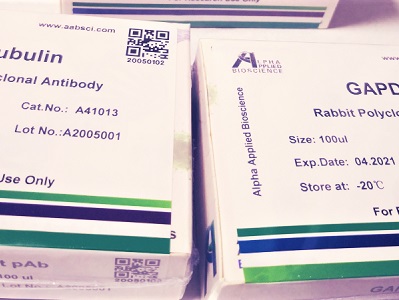

Ataxin-1 rabbit pAb
Cat :A10935
-
Source
Rabbit
-
Applications
WB,IHC,IF,ELISA
-
Reactivity
Human,Mouse
-
Dilution
IHC: 1:100 - 1:300. IF: 1:200 - 1:1000. ELISA: 1:5000. Not yet tested in other applications.
-
Storage
-20°C/1 year
-
Specificity
Ataxin-1 Polyclonal Antibody detects endogenous levels of Ataxin-1 protein.
-
Source/Purification
The antibody was affinity-purified from rabbit antiserum by affinity-chromatography using epitope-specific immunogen.
-
Immunogen
The antiserum was produced against synthesized peptide derived from human Ataxin 1. AA range:742-791
-
Uniprot No
P54253
-
Alternative names
ATXN1; ATX1; SCA1; Ataxin-1; Spinocerebellar ataxia type 1 protein
-
Form
Liquid in PBS containing 50% glycerol, 0.5% BSA and 0.02% sodium azide.
-
Clonality
Polyclonal
-
Isotype
IgG
-
Background
ataxin 1(ATXN1) Homo sapiens The autosomal dominant cerebellar ataxias (ADCA) are a heterogeneous group of neurodegenerative disorders characterized by progressive degeneration of the cerebellum, brain stem and spinal cord. Clinically, ADCA has been divided into three groups: ADCA types I-III. ADCAI is genetically heterogeneous, with five genetic loci, designated spinocerebellar ataxia (SCA) 1, 2, 3, 4 and 6, being assigned to five different chromosomes. ADCAII, which always presents with retinal degeneration (SCA7), and ADCAIII often referred to as the `pure' cerebellar syndrome (SCA5), are most likely homogeneous disorders. Several SCA genes have been cloned and shown to contain CAG repeats in their coding regions. ADCA is caused by the expansion of the CAG repeats, producing an elongated polyglutamine tract in the corresponding protein. The expanded repeats are variable in size and unstable, usually increasing in size when transmitted
-
Other
ATXN1, Ataxin-1
-
Mol.Wt (Da)
87051
-
Concentration
1 mg/ml
| Product | Reactivity | Applications | Conjugation | Catalog | Images |
|---|
-
 400-836-3211
400-836-3211
-
 support@aabsci.com
support@aabsci.com
-
β-actin rabbit pAb ...... >
-
β-actin rabbit pAb(A284) ...... >
-
Plant-actin rabbit pAb ...... >
-
β-tubulin mouse mAb(M7) ...... >
-
GAPDH mouse mAb(2B8) ...... >
-
GAPDH mouse mAb(PT0325) ...... >
-
Histone H3 rabbit pAb ...... >
-
Histone H3 rabbit pAb ...... >
-
COX IV mouse mAb(6C8) ...... >
-
GFP-Tag mouse mAb(1G6) ...... >
-
HA-Tag mouse mAb(1B10) ...... >
-
mCherry-Tag mouse mAb(6B3) ...... >










 400-836-3211
400-836-3211
